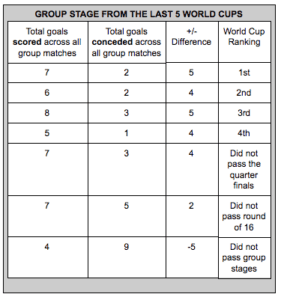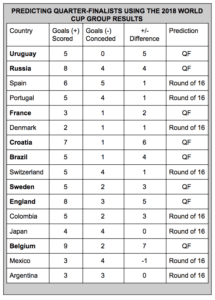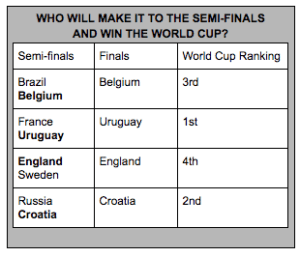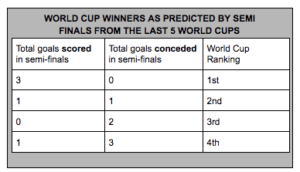From the constant streams of news headlines and the trending hashtag ‘INSANE’ on twitter, it seems that the 2018 Russia World Cup will not be quickly forgotten. Not only has the twists and turns of this tournament left the world stunned, the defeat of teams such as Germany, Portugal, Argentina and Spain have left many nations devastated. As experts are now saying, it really seems to be anyone’s game, making it very tough for anyone to predict which team will emerge victorious once the dust settles.
Is past data the best indicator for future success?
When it comes to predicting the future, we believe there is no better indicator than past data. We’re not talking about data of the past winners but rather the cold, hard statistical facts from the group stage performance. Kitman Labs examined historical data of the past five world cups, looking in particular at the number of goals teams needed to score on average versus the average number of goals that they conceded when they progressed through each round.

Teams were more likely to progress through to the knockout rounds when they scored one more goal than they conceded during the group stage. Data also showed, on average, that teams who were successful in making it to the quarter final of the FIFA World Cup score four to five more goals than they conceded during the group stages. Yet for teams who did concede more than three goals they could still secure their place in the semi-finals if they created a goal margin equal to or greater than five whilst in the group stages.
Predicting the quarter final competitors of the Russia World Cup
We applied these statistical rules to the 2018 group stages, and found that we successfully predicted 14 of the 16 teams who made it through to the knockout rounds. France was the only team whose goal margin of 2 did not match our analysis. Furthermore, by using a purely objective view, we can predict 75% of the teams who made it to the World Cup quarter finals, with Uruguay, Russia, Croatia, Brazil, England and Belgium all having a goals scored vs conceded difference greater than 4.

Who will make the semi-finals?
If we apply the same statistical rules from the group stages, we should see teams who have the bigger goal margin making it through to the semi-finals. With their smaller goals scored to goals conceded margin of two, France and Sweden should both not qualify past the quarter finals. Although France’s performance against Argentina in the knockout round was outstanding, this performance model looks at team performance across all group games, not the individual performance in any match beyond the group stage. However, based on their building performance over the last few matches, it could be perfect timing for the team to peak towards the quarter finals – and potentially break the statistical model. Although when we still applied our statistical model to France and Sweden, against their opponents Denmark and Switzerland in the knock out rounds, they also followed the trend of having a stronger goal margin during the group stage.
Also during the group stage Belgium and Croatia both had stronger performances than their soon to be quarter-final opponents Brazil and Russia, and therefore based on the model we predict both teams will progress on to the semi-final stages. It is quite challenging to objectively anticipate the final rankings for the World Cup purely through the numbers, as the group stage goal margins decrease to only a goal difference for teams in the quarter finals. However, if we had to predict the final rankings using the same statistical rules from the group stages, we believe that Uruguay will emerge as the new world champion, after playing Croatia in the finals. England will lose out in the runners-up match coming fourth, whilst Belgium after their world-class campaign will finish third.

So according to the numbers, who will win?
Team performance during the semi-finals has its own unique set of statistical rules. According to our historical analysis of the past five world cup semi-final matches, the future world champions will have the biggest margin between goals scored and goals conceded. The team most likely to progress on to finals and place second will have no margin between goals scored and goals conceded, whilst the teams most likely to place third and fourth will concede more points during the semi-finals, and any points scored will most likely occur due to penalties.

Using the statistical rules from the group stages we predict that Belgium, Uruguay, England and Croatia will make it through the semi-finals, but as to which team will be raising the World Cup?
Check back after the semi-finals take place to see our updated predictions once we apply the unique model.




